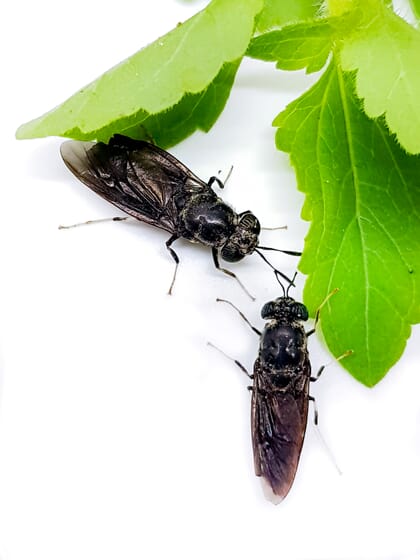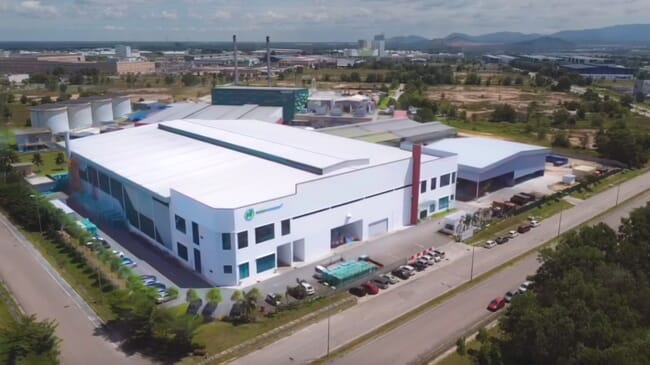
Nutrition Technologies' vertical insect farm can bioconvert low-grade food and crop waste into sustainable aquafeed ingredients and fertilisers © Nutrition Technologies
Nutrition Technologies completed an equity venture round of $20 million on 19 September. The round was led by PTT Ventures and supported by Sumitomo Corporation, ING Sustainable Investments, Mandala Capital, as well as continued participation from existing investors: Openspace Ventures, SEEDs Capital and Hera Capital. The round was advised by ING Corporate Finance. The proceeds will be used to fund an expansion into new markets; launch new products; accelerate R&D and create new strategic partnerships.
Since 2015, the company has been creating a commercial replica of the natural decomposition process using their proprietary growth inoculants and black soldier flies. Their vertical insect platform can turn low-grade crop and food waste into a high-quality fish and livestock feed ingredient, as well as a biofertiliser. Nutrition Techology’s two-hectare production facility in Johor, Malaysia, bioconverts several hundreds of tonnes of organic waste every week, and produces functional proteins and oils that contain bioactive compounds that improve animal growth and performance. . Their team developed the entire production system, which uses some bespoke automated equipment to ensure strict biosafety, zero-waste and strong unit economics. Through avoided emissions, their products have great potential to help meet global climate change targets.
Over the past few years Nutrition Technologies has conducted multiple trials of their products on fish, shrimp, poultry, piglets and pets, with significant results. The 165-strong team has been scaling up their operations and selling their products into both domestic and regional markets.
Dr Buranin Rattanasombat, senior executive vice president for innovation and new ventures at PTT and one of the key investors in the latest funding round said, “we look forward to partnering with Nutrition Technologies to support their next phase of growth. Commercial insect protein production is one of the most important innovations of the past few years, with the potential to disrupt the animal feed and fertiliser sectors and solve multiple issues the world is currently facing. Furthermore, we expect this partnership will provide customers with innovative solutions to revolutionise the agriculture sector as well as improve people's quality of life.”
“Nutrition Technologies has led the way in delivering black soldier fly solutions at scale and at a price that is competitive on the global markets,” said Hian Goh, founding partner at Openspace Ventures. “It means they are already providing a viable alternative to existing and less sustainable feed options. In achieving that, the team has demonstrated exceptional executional capabilities. Going forward, we have high conviction in their expansion plans,” he said.

The company plans to expand its operations across Southeast Asia © Nutrition Technologies
“It is great to welcome our new investors, who collectively bring vast expertise and experience to help us realise our vision. We are also humbled by the continued support provided from our existing shareholders.” said Tom Berry, co-CEO and co-founder of Nutrition Technologies.
Next Steps
Nutrition Technologies will use these funds to further expand production capacity both at its current operating plant in Malaysia as well as through a new joint-venture project in a soon-to-be-announced second country in Southeast Asia. The Company also intends to expand its R&D capabilities in Singapore; commence commercial activities in the UK and EU; and add several new patents to its existing IP portfolio. “We believe our technological developments can help address some of the world’s most critical problems and are highly motivated to accelerate expansion as quickly as possible. Our novel microbiology solution to insect production allows us to use a wide pool of raw materials which negates the most significant barrier to scaling,” said Charlie Carter, COO, Nutrition Technologies.

The insect sector has gathered increasing attention over the past few years, with the global insect protein market alone estimated to be worth $343 million in 2021, and expected to grow with a CAGR of 26.49 percent to reach $1.3 billion by 2027. As a sustainable solution to help minimise multiple unsustainable practices, the sector as a whole has seen investments totalling nearly $1 billion, but with multiple technological hurdles, few companies are yet to reach industrial scale, let alone profitability.




